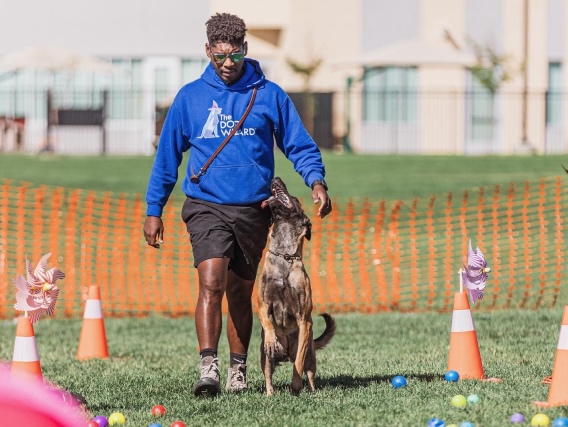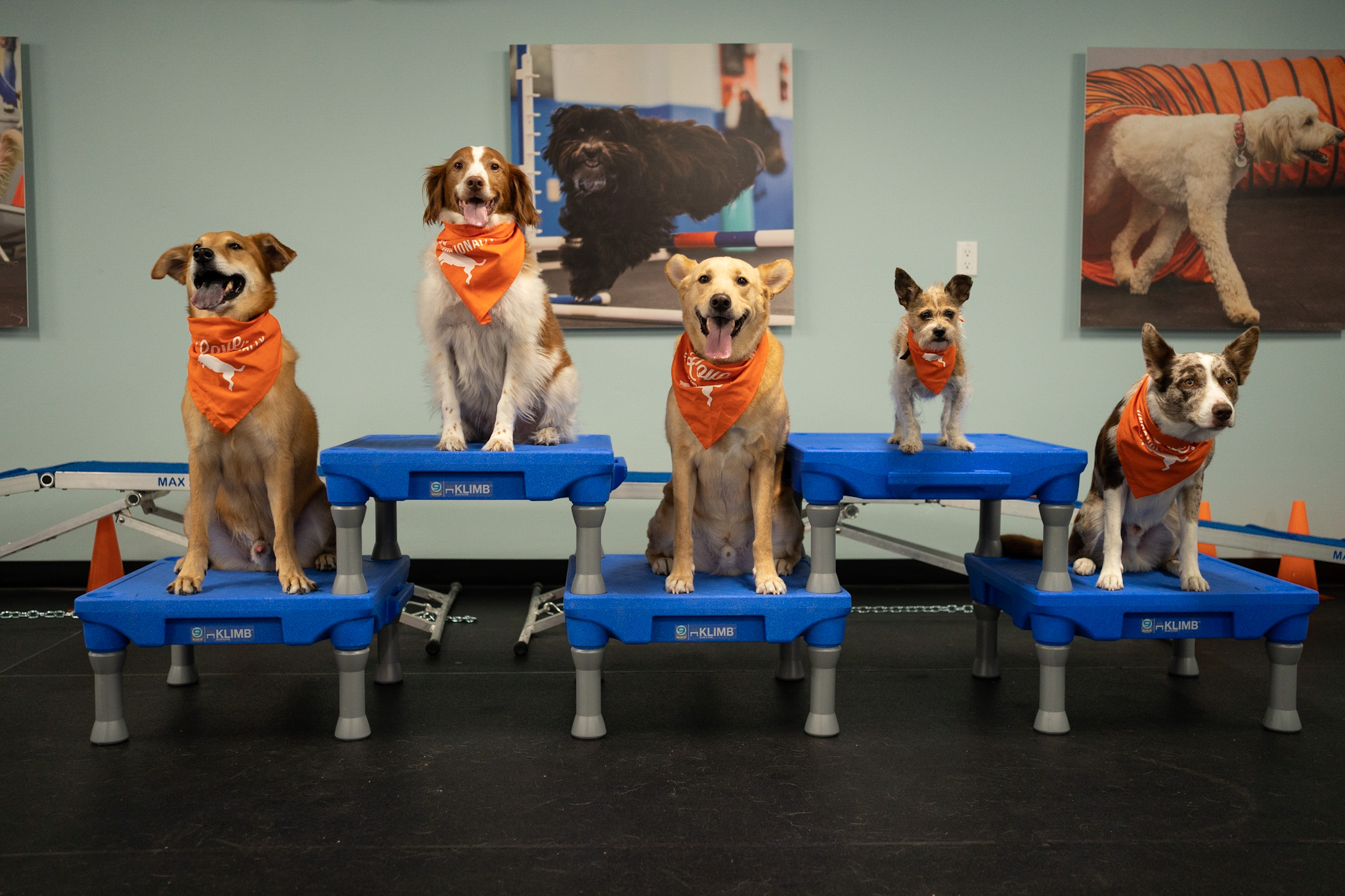Unleash Potential with Dog Training Near Me: Discover Your Local Experts
Unleash Potential with Dog Training Near Me: Discover Your Local Experts
Blog Article
Unlock Your Dog's Prospective: Proven Canine Training Approaches for Success
Effective pet dog training is a nuanced procedure that hinges on understanding canine behavior and utilizing clinically backed techniques. By including positive support, developing clear commands, and prioritizing socializing, dog proprietors can grow an effective relationship with their family pets.
Understanding Pet Habits
Comprehending pet dog habits is vital for efficient training and fostering a favorable relationship between pets and their proprietors. A detailed understanding of canine body movement, vocalizations, and social interactions is critical for identifying their feelings and demands. Dogs connect largely with non-verbal hints; for instance, a wagging tail may indicate excitement, while pinned ears can signify anxiety or submission.

Additionally, ecological elements play a significant role fit a dog's habits. Adjustments in regular, brand-new environments, or the visibility of strange people can lead to stress and anxiety or stress and anxiety in pets. Identifying these triggers enables proprietors to reduce unfavorable responses and create suitable training methods.
Eventually, a deep understanding of dog behavior lays the foundation for effective training techniques, boosting both behavior and the general bond in between the dog and its owner. dog training charlotte nc. This knowledge is essential for promoting a well-adjusted, satisfied canine buddy
Positive Support Techniques
Efficient training counts greatly on positive reinforcement techniques, which have actually been revealed to generate considerable cause shaping preferred actions in pets. This strategy involves rewarding a canine for displaying particular behaviors, thereby raising the likelihood that these behaviors will certainly be repeated. Rewards can take different kinds, consisting of deals with, praise, toys, or playtime, relying on what encourages the specific canine.

It is vital to progressively eliminate incentives as the pet dog finds out the actions, transitioning to recurring support. This method preserves the actions gradually while avoiding reliance on consistent benefits. By concentrating on positive reinforcement, trainers can cultivate a trusting partnership with their dogs, promoting a participating and healthy training atmosphere that boosts overall obedience and efficiency.
Establishing Constant Commands
A basic element of effective pet training is the facility of constant commands. Consistency in commands is critical for efficient interaction between the dog and the trainer. When commands are consistent, pet dogs learn to associate details words with preferred behaviors, which speeds up the training process and enhances understanding.
To develop constant commands, it is crucial that all relative use the very same terminology and gestures. For instance, if someone makes use of "sit" while another says "take a seat," it can create confusion for the dog. Select clear, distinct words for commands and make sure everybody involved in the dog's training adheres to these options.
Additionally, repetition is essential. Enhance commands via constant technique, making certain that the canine obtains ample opportunities to react appropriately. When a pet dog effectively follows a command, instant positive support should follow. This can be in the kind of deals with, appreciation, or play, solidifying the link between the command and the action.
Lastly, be person. Establishing regular commands requires time and effort. With devotion and clearness, you will assist your pet dog develop a strong understanding of assumptions, eventually causing a well-behaved companion.
Socializing and Direct Exposure
Interacting socially a canine is necessary for promoting a confident and well-adjusted buddy. This process involves revealing your pet dog to a selection of settings, people, and various other animals to establish their social skills and flexibility. Early socialization, ideally in between the ages of three to fourteen weeks, is vital, as it lays the foundation for a canine's future actions.
Throughout socializing, objective to supply positive experiences in various settings, such as parks, busy roads, and homes with other animals. Present your dog to different stimulations, including noises, views, and scents, making certain that each encounter is rewarding. This direct exposure aids reduce anxiety and stress and anxiety, leading the way for a more resilient pet.
Participating in regulated group play sessions with other pets can likewise improve social skills, showing your pet dog proper interactions and boundaries. Constantly monitor your pet's convenience degree during these experiences, gradually enhancing direct exposure as their self-confidence expands. Bear in mind, the objective is to create a well-rounded pet dog that flourishes in varied scenarios, advertising a harmonious relationship with both human beings and various other animals. Focusing on socialization will dramatically add to your pet dog's overall happiness and actions throughout their life.
Overcoming Common Training Difficulties

Pet dogs might battle to concentrate in busy or unfamiliar settings. Gradually desensitize your canine to interruptions by beginning training in a peaceful setting and gradually presenting even more stimuli as they come to be competent.
Additionally, behavioral problems like leaping or excessive barking can become frustrating. Address these by educating alternate actions, such as sitting steadly when greeting guests. Uniformity and patience are essential; enhance preferred actions continually and prevent abuse, which can lead to complication.
Finally, acknowledge that each pet dog is one-of-a-kind, and training site link timelines may vary. Dressmaker your technique to your canine's individual needs, and seek expert support if essential. With determination and the best strategies, getting rid of these difficulties can cause a trained, happy canine companion.
Final Thought
Finally, unlocking a canine's prospective necessitates an extensive method that includes an understanding of canine habits, the application of positive reinforcement techniques, and the establishment of constant commands. Early socializing and exposure to varied environments further boost a pet's adaptability and confidence. By resolving common training obstacles with tailored approaches and patience, a unified and participating relationship in between pet sites dog and handler can be fostered, inevitably resulting in a well-behaved buddy with the ability of prospering in various scenarios.
Efficient canine training is a nuanced process that pivots on comprehending canine actions and utilizing scientifically backed approaches.Understanding dog habits is important for efficient training and fostering a favorable relationship in between dogs and their proprietors.Effective training counts greatly on positive reinforcement techniques, which have actually been revealed to generate considerable outcomes in shaping desired habits in dogs. When commands are uniform, pets discover to connect particular words with preferred habits, which accelerates the training procedure and improves understanding.
In conclusion, unlocking a dog's possible requires an extensive strategy messy pet cat deterrent that incorporates an understanding of canine actions, the application of favorable reinforcement methods, and the establishment of constant commands.
Report this page